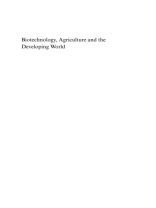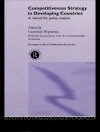How will the industrial changes implicit within new biotechnologies affect modern agriculture? This book investigates these changes and provides an economic analysis of the industrial and distributional impacts of new biotechnologies, addressing in detail the significant consequences for developing countries.One of the most important facets of biotechnological change is the development of new technologies for appropriating the value of innovations in related industries. In agriculture these new appropriation technologies are known as ‘genetic use restriction technologies’, which enable the innovator to capture the value of innovative plant varieties by preventing their reproduction after purchase. This book analyses the implications of such technologies in terms of global agricultural production, the rate of innovation at the technological frontier and, in particular, the diffusion of these innovations across the globe. The authors set forth the economic and institutional framework within which innovations are occurring, focusing on the impacts on the least technologically advanced nations and their incentives to conserve genetic resources for use in future research and development.This stimulating book should be widely read by agricultural and resource economists, development economists, and scholars and researchers of environmental economics. Policymakers in developing countries will also gain valuable insights into the distribution of the potential benefits from biotechnology.
Timothy M. Swanson
Biotechnology, Agriculture and the Developing World [PDF ebook]
The Distributional Implications of Technological Change
Biotechnology, Agriculture and the Developing World [PDF ebook]
The Distributional Implications of Technological Change
Koop dit e-boek en ontvang er nog 1 GRATIS!
Taal Engels ● Formaat PDF ● ISBN 9781843767435 ● Editor Timothy M. Swanson ● Uitgeverij Edward Elgar Publishing Ltd ● Gepubliceerd 2002 ● Downloadbare 3 keer ● Valuta EUR ● ID 8079794 ● Kopieerbeveiliging Adobe DRM
Vereist een DRM-compatibele e-boeklezer












